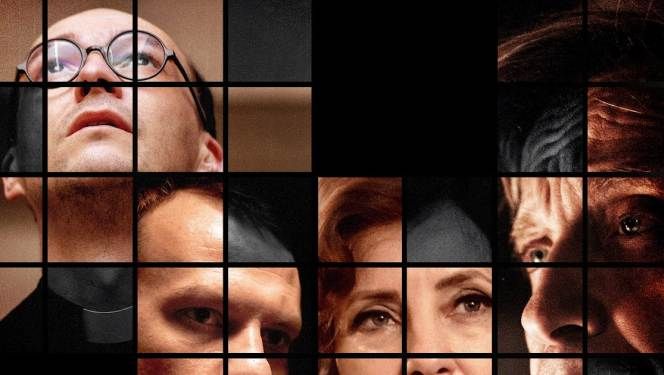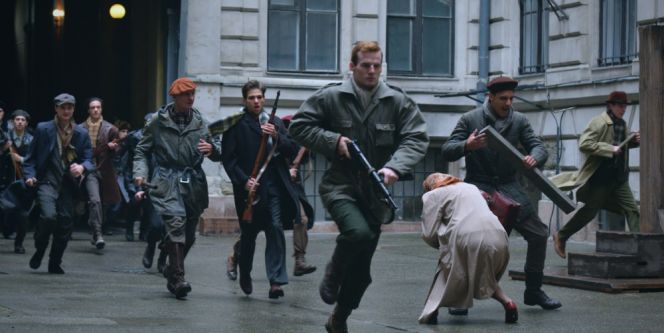MOVIE REVIEW – It’s 1956, just after the defeated revolution, and two young lovers and former revolutionaries are on the run on an overcrowded train hurtling towards freedom. And in a parallel story, we see the slow madness of a priest, imprisoned and subjected to psychological torture by the guards, as he escapes into a chess instruction book. The two plot threads are, of course, intertwined in Barnabás Tóth’s new film, a taut, suspenseful, twisty thriller that the Hungarian film industry, stagnating in romcoms and pathos-filled historical films, needed like a loaf of bread.
A free adaptation of Stefan Zweig’s Sakknovella, Mastergame is set in 1956, shortly after the revolution. The film’s trailer, and other films that have dealt with the revolution in general, might at first glance lead you to believe that this is another pathos-filled, tragic, navel-gazing drama about 1956, the ordeal of the emigrants and prisoners, but fortunately it is not. The Masterpiece is more reminiscent of various genre films, such as spy films (including From Russia with Love) or films dealing with surreal mysteries. Without spoiling anything, I was also reminded of the basic motif of two classic horror films with an astonishing twist, and this was definitely a good thing for Master Jester.
Two main plot threads
Mastergame basically tells two storylines. On the one hand, we get to know the story of two young people on the run, one of whom is Márta (Sára Varga-Járó), a great chess talent, and István (played by Gergely Váradi, known from the Besúgó series), a pushy, a bit of a con artist, but basically a good-hearted young guy who was also a revolutionary. On the other hand, the ordeal of a priest, “B” (Károly Hajduk), who is captured by the ÁVH and subjected to psychological torture by a female officer in order to extract the whereabouts of a “treasure” supposedly destined for the Vatican. One method of torturing B is to prevent her from seeing the face of her guards, and other devious ways to drive her practically insane in an attempt to get her to reveal the whereabouts of the ‘treasure’.
While at first the two plot threads run in parallel, they are later cleverly linked through the character of the priest. Although it is not clear who the real protagonist is, this is fine, and adds to the tension of the film. Hajduk, who has already shown in The Martyr’s Fury what he is capable of in portraying such a mentally damaged character, is now once again superb as the schizophrenic priest. Next to him, Gergely Váradi also confidently plays the character of the pushy revolutionary boy who is head over heels in love with his girlfriend.
A third important character is Sándor Czentovics (Pál Mácsai), a mysterious rich stranger whom the young people meet on the train and who is willing to sit down with Marta to play chess, and in cash, so that the couple can recover the “wasted” money that István was forced to pay a human trafficker (David Yengibarian) to board the train.
Another interesting character is the femme fatale-like character played by Bori Péterfy, who is constantly having a go at István. Her character is also slowly revealing her role in this strange thriller.
The great rhythm keeps going all the time
A strong positive aspect of the film is that you will never get bored, thanks to both the well-developed script and the highly creative visuals. There is also a very punchy action scene, which reminded me of the scene in Love in Russia between Bond and Red Grant, although it was not that brutal.
Perhaps the only criticism of Mastergame is that some of the dialogue is a bit forced, and some of the story elements are not very logical or believable. Although there is a huge twist in the story, even this does not adequately explain these logical blunders. Fortunately, there are not too many of them.
After the many silly romcoms with which the Hungarian film industry is constantly tormenting audiences and critics, it is a real relief to see such a great psychological thriller, with both well-portioned and astonishing twists and turns, and with credible performances. If you like this kind of film, we think you should not miss Barnabás Tóth’s work, even if you will not learn to play chess from it.
-BadSector-
Mastergame
Direction - 8.4
Actors - 8.5
Story - 8.2
Visuals/Music/Sounds - 8.3
Ambience - 8.2
8.3
KIVÁLÓ
Mastergame is a psychological thriller with a twist, unfolding in the shadow of the '56 revolution, where chess is the only refuge. Barnabás Tóth's film skilfully combines character drama with suspenseful thriller elements. The interweaving of the two plot threads creates a strong story arc that stands out in Hungarian cinema, although one or two of the story elements are not very logical or believable, but this does not detract much from the overall picture.

















Leave a Reply